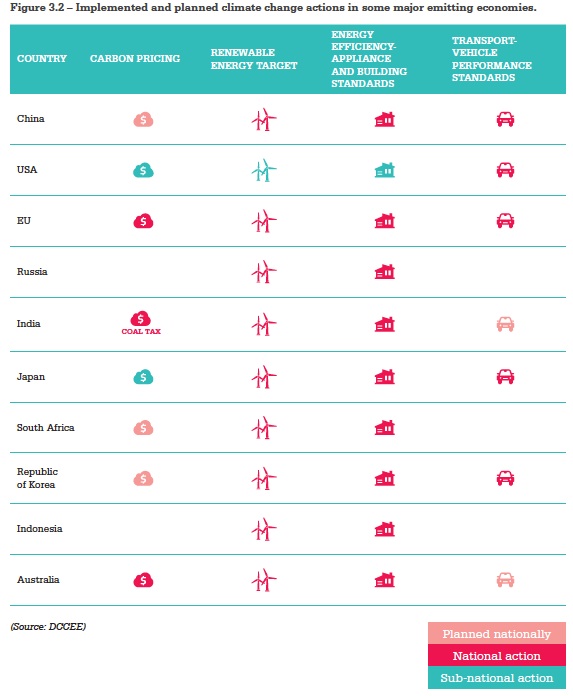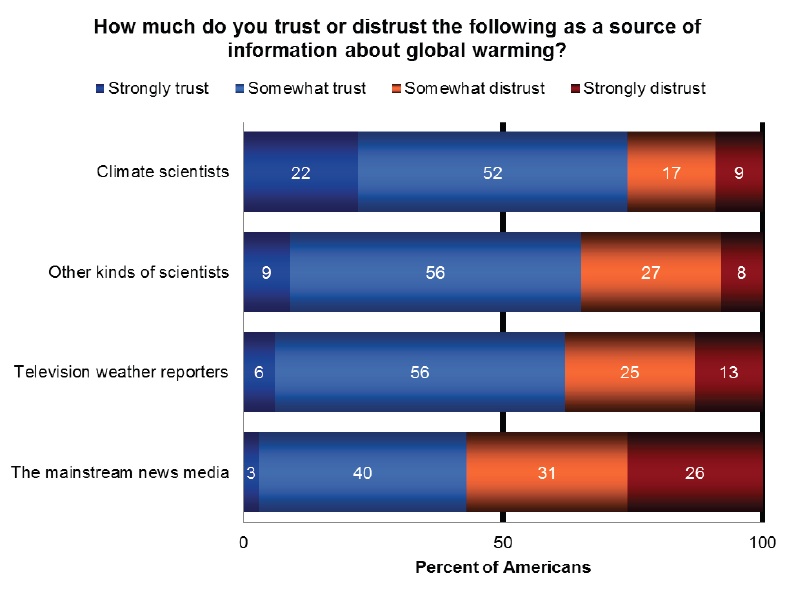How to Solve the Climate Problem: a Step-by-Step Guide
Posted on 14 September 2012 by dana1981
Recently we have seen that if we fail to take serious action very soon to reduce our greenhouse gas emissions, the future climate will be much less hospitable than today's, with potentially catastrophic results. We have also seen that our political leaders are currently failing to take the necessary steps to avoid a potentially catastrophic future. This begs an important question - how do we change that? In this post we will begin with the large-scale changes that are necessary, and work backwards to see what we can do as individuals on a smaller scale to make those big changes happen.
Pricing or Regulating Carbon Emissions?
In order to achieve the necessary large-scale greenhouse gas emissions reductions, some form of government action is required. There is simply no way we can stay within our carbon emissions budget with only individual or small-scale efforts. On a national level, emissions can be reduced through simple government regulation, as the USA has begun implementing through the Environmental Protection Agency.
However, putting a price on carbon emissions will generally have a smaller economic impact than government regulations. A carbon emissions price allows consumers to consider the costs of these emissions and adjust their purchasing decisions accordingly, effectively allowing the free market to assist in the emissions reductions. Currently, carbon emissions are what's known as an economic "externality" - a factor whose true costs are not included in the price of associated products (i.e. fossil fuels).
Carbon emissions do damage through their impacts as a result of climate change (for example, economic losses via damaged crops from increased drought frequency), but that cost is not currently reflected in the products' market price, so consumers cannot take them into account when they purchase fossil fuels. Economists consider this type of externality an economic and free market failure.
There are many different options in implementing carbon pricing - a carbon tax, cap and trade system, cap and dividend, etc. Each has upsides and downsides which are worth debating, but the important first step is to remedy this market failure and put some sort of price on carbon emissions.
Fortunately, some governments have listened to these economists and implemented carbon pricing systems. The European Union (EU) has long led the way, implementing a cap and trade system in 2005. Australia just recently set a carbon tax and plans to join the EU emissions trading market (although the opposition party is trying to kill the Australian carbon pricing system). In the USA, nine northeastern states have a modest cap and trade system, and California is poised to implement a much more ambitious system in 2013. British Columbia has implemented a successful carbon tax, but the USA and Canada do not have national carbon pricing systems.
Implemented and planned climate change actions in some major emitting economies. Blue represents a sub-national action, pink represents a planned national action, and red represents an implemented national action.
So how do we ensure that the countries with national carbon pricing systems keep and strengthen them, and convince the countries without such national systems to implement them?
Demand Climate Policy
Most of us live in democracies, and we can therefore influence national climate policy by making our priorities known. Climate change is the gravest threat humans currently face, and it should therefore be at the top of policymakers' list of priorities. However, in a democracy, policymakers' priorities are generally determined by the voters who put them in office.
So first of all, we can make climate policy one of our top determining factors in who we vote for. We can write letters and/or sign petitions to our policymakers to ensure they know our vote is contingent on their support for climate policy. We can encourage other voters to follow suit. The only way to make carbon pricing a top priority for our policymakers is to show them that it's a top priority for their voting constituents.
Educate People
Before they will make it a top priority, people must first understand the magnitude of the climate problem, which many currently do not. In the USA for example, while a majority of the population supports climate policy, they do not see it as a priority. Until the issue is considered a top priority by voters, there is no pressure for policymakers to implement carbon pricing.
The climate disinformation campaign has been very effective on this issue. Despite the overwhelming consensus amongst climate experts that humans are causing global warming, only 53% of Americans believe humans are the primary cause, and only 58% believe that most scientists agree that global warming is even occurring.
According to the March 2012 George Mason Center for Climate Change Communication (CCCC) national poll, climate scientists are the most trusted source for climate science information, with 74% of public trust.
Responses to the George Mason CCCC poll question "How much do you trust or distrust the following as a source of information about global warming?"
Thus as Ding et al. (2011) concluded, if a larger percentage of people realized that there is a scientific consensus on the issue amongst the group they trust most on the subject, more people would believe that humans are causing global warming, and more people would demand that we do something about it. Thus it is critical to educate people not just on the scientific evidence, but perhaps more importantly, about the existence of the expert climate consensus.
A populace can only make informed decisions if it is adequately informed, and right now the public as a whole is misinformed about climate change. We can all make a difference on this issue by educating those we know, and we believe Skeptical Science is a good resource to accomplish this. However, our individual and collective reach is limited - most people are informed (and/or misinformed) by the mainstream media.
Demand Factually Accurate News
Unfortunately the mainstream media tends to believe that false balance is more important than factually accurate reporting. Too many journalists and news organizations are afraid of being labeled as "biased" if they do not report "both sides" of a story, even if one side is not supported by the evidence. Thus the climate contrarian position receives nearly as much media coverage as the mainstream position, even though the contrarians comprise less than 3% of climate experts. This over-representation of the climate contrarian position in the mainstream media for the sake of false balance is undoubtedly the main reason why such a large percentage of the populace is unaware of the climate consensus.
So how do we influence the mainstream media to prioritize factually accurate reporting over false balance? Just as politicians are influenced by their voting constituencies, the media can be influenced by its viewers/readers. Television advertising dollars are often driven by the number of viewers, newspaper advertising dollars are driven by the number of subscribers, and online media advertising dollars are driven by the number of pageviews.
An independent study demonstrated that viewers prefer quality TV programming. We can reward good stories and media outlets by viewing and subscribing to them (and encouraging others to follow suit) and discourage bad stories and media outlets by ignoring them; thus we can begin to influence journalists' priorities by making them recognize that their readers value factual accuracy over false balance.
This is something of a challenge for Skeptical Science, because we believe debunking climate myths in the mainstream media is an important exercise, but we draw attention to those stories in the process. By quoting directly from the stories, we do allow our readers to see the myths and debunkings without necessarily having to read the stories themselves and give them additional pageviews. However, we may reduce our number of mainstream media debunkings in the future. As they say, "do not feed the trolls."
Using Social Media
We can each extend our individual reach on this issue through the use of social media. For example, when encountering a factually accurate mainstream media story which does not fall into the false balance trap, we can share it on social media sites like Twitter and Facebook to encourage those in our social media circle to also view the article and add to its traffic. Right now the media also tends to operate under the principle that "controversy sells," and climate contrarian positions inevitably create the controversy that generates viewer traffic.
Only by increasing traffic to the stories that focus on factually accurate information rather than creating a false sense of controversy can we convince the media otherwise, and social media is a useful tool to accomplish that.
Summary
Only when the media focuses on factually accurate reporting will the public become correctly informed on climate change. Only then will the public come to understand that the experts are in agreement about the climate threat, and that we must make it a priority. Only then will the public demand that our policymakers take action to address climate change, and only then will those policymakers implement serious climate change mitigation policies.
It's important to remember that in both democratic and capitalist systems, we each have a significant amount of influence. Our traffic drives advertising dollars for the media, and our votes determine our policymakers' priorities. We can each extend our individual influence through the tools of the internet such as social media. So let's get to work and solve this problem.































 Arguments
Arguments

























 0
0  0
0






Comments